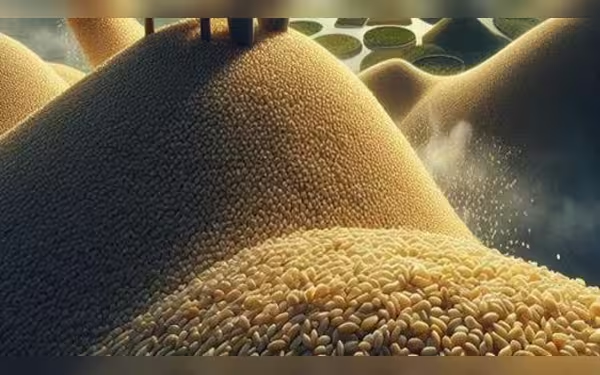Thursday, July 4, 2024 07:35 PM
Dr. Sajid Rehman leads AARI in sesame seed innovation
- AARI pioneers climate-resistant sesame varieties for Pakistani farmers
- Sesame cultivation expands in Pakistan, boosting agricultural exports
- Sesame seeds offer health benefits and diverse industrial applications
 Image Credits: nation_pk
Image Credits: nation_pkThe Ayub Agricultural Research Institute in Pakistan leads in developing climate-resistant sesame varieties, boosting agricultural exports and promoting sustainable agriculture.
The Ayub Agricultural Research Institute (AARI) in Pakistan is at the forefront of developing new varieties of sesame seeds that can withstand the challenges posed by climate change. Led by Dr. Sajid Rehman, the Director General of AARI, the institute is dedicated to supporting farmers by introducing these resilient sesame varieties. Sesame, a crop with immense potential, has significantly contributed to Pakistan's economy, with recent exports reaching $1.5 billion, bolstering the country's foreign exchange reserves.
Dr. Rehman underscores the importance of sesame in boosting agricultural exports, particularly in light of the Pakistan-China Free Trade Agreement. Farmers are being urged to adopt advanced cultivation techniques and focus on climate-resistant crops like sesame to enhance their profitability and sustainability.
Despite its promising prospects, sesame remains relatively underappreciated compared to staple crops like wheat and cotton in Pakistan. Farmers like Ali Raza, who recognize the benefits of sesame cultivation, are facing challenges in finding reliable buyers for their produce.
In recent years, the cultivation area for sesame has expanded significantly, surpassing one million acres, thanks to the introduction of new varieties, improved productivity per acre, and enhanced marketing strategies. Pakistan's agricultural exports, including sesame, rice, fruits, and vegetables, have collectively generated over $7 billion in revenue this year.
Sesame seeds are not only a rich source of essential nutrients like calcium, iron, and copper but also offer various health benefits such as promoting bone strength and alleviating joint pain. Moreover, sesame seeds are used to produce high-quality edible oil and protein, serving diverse industries such as medicine, soap, and perfumery. Additionally, sesame plays a crucial role in animal feed formulations.
The collaboration between Pakistan and China in exchanging germ plasma of different crop varieties, including sesame, rice, and cotton, is poised to revolutionize the agricultural landscape. This partnership presents a unique opportunity for Pakistani farmers to boost their profitability and adapt to changing climate conditions.
Dr. Ihsan from AARI's Oilseeds Department highlights the water-efficient nature of sesame cultivation, making it an attractive option for farmers grappling with water scarcity. Unlike water-intensive crops like rice and cotton, sesame requires less water, enabling farmers to explore double cropping and increase their earnings.
The growing focus on climate-resistant sesame farming in Pakistan not only promises economic benefits but also underscores the importance of sustainable agriculture in the face of changing environmental conditions. By embracing sesame cultivation and leveraging its diverse applications, Pakistani farmers have the opportunity to thrive in a rapidly evolving agricultural sector.













